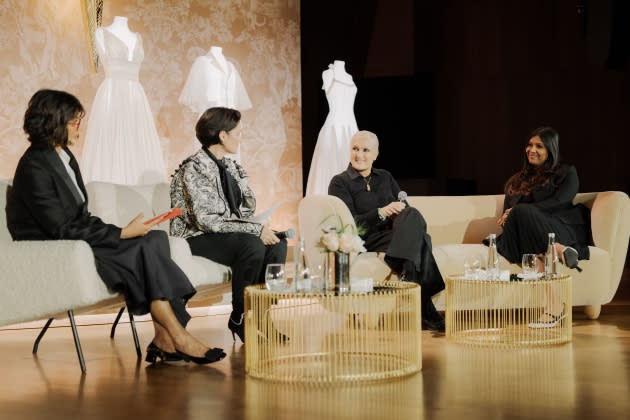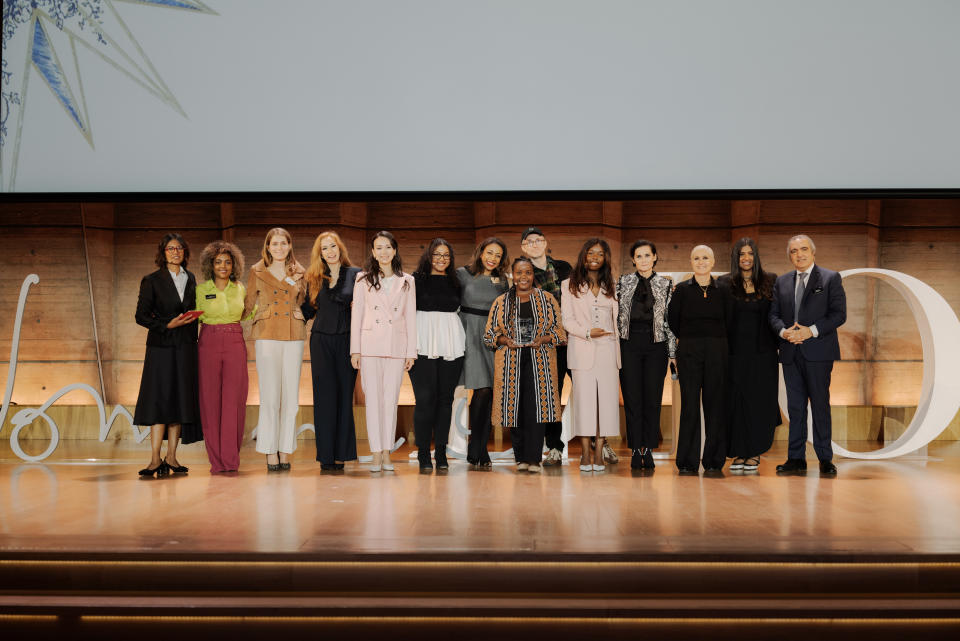Maria Grazia Chiuri Addresses Women@Dior Conference at UNESCO
- Oops!Something went wrong.Please try again later.

PARIS — Dior marked International Women’s Day with a conference for its Women@Dior mentoring and educational program at UNESCO’s headquarters in Paris, which gathered young women from around the world and rewarded two initiatives presented as part of its Dream for Change Project.
Speakers at the fourth edition of the event included Maria Grazia Chiuri, artistic director of womenswear collections at Dior, in conversation with Karishma Swali, artistic director of the Chanakya embroidery workshop and school in Mumbai. Attendees also heard from a range of female entrepreneurs and activists.
More from WWD
Though a feel-good vibe prevailed, Emmanuelle Favre, senior vice president of human resources at Christian Dior Couture, kicked off the proceedings with a reminder of the many challenges still facing women in countries including Iran, Afghanistan and Ukraine.
RELATED: The 2023 Most Inspirational Women Leaders Share an Important Common Link
“All over the world, women’s rights and freedom continue to be under attack. Despite this very sad news, I’m still hopeful and I want to highlight where women and the equality of our rights have progressed,” she said. “Women are strong and resilient and we don’t want to be reduced to the status of victims.”
In an interview with WWD, the French executive detailed how the program, launched in 2017, has grown from having 30 mentees in its first edition to 400 at present. “Each year, it gains in visibility and scope,” Favre said.
During the coronavirus pandemic, Dior joined forces with UNESCO’s Global Education Coalition to launch an online learning platform to address school closure gaps and expand the initiative globally. Participants have access to courses taught by professors from schools such as Central Saint Martins in London, Bocconi University in Milan and HEC in Paris.
The program, initially conceived as a woman-to-woman mentorship network, has also opened up to men, who now account for a fifth of the mentors.
Charles Delapalme, managing director of Christian Dior Couture, spoke about the importance of being an ally in the business world in a talk with Monika Figlewicz, president of the company’s Chinese division.
“I didn’t choose Monika because she was a woman. I didn’t choose her in spite of being a woman. I just chose her because she was the best for the job I had in mind,” he said, noting that another female executive — Alexandra Winokur — was poised to take over as president of Christian Dior Couture Americas this month.
Delapalme recommended that women remain true to their identity in the workplace. “Leadership is about being yourself and liking yourself as you are, so my advice would be: don’t try to be somebody else’s type of leader, to try to copy someone who’s not you,” he said.
With 65 percent of female employees, Dior has plenty of role models for aspiring career women. Seven years ago, Chiuri became the French fashion house’s first female artistic director, and Delphine Arnault took over this month as chairman and chief executive officer.
Last year, the company recruited 2,000 people under 30, including 800 apprentices, according to Favre. Yet few women make it into top leadership positions.
“We hire a lot of women who rise through the ranks at the house, but at a certain point, they are less ambitious and less keen than men to take on positions of responsibility. So the idea of this program is to get to young women very early — they are in the last two years of their studies — and to give them confidence in themselves,” she said.
Chiuri noted that too often, women were afraid to fail. “Don’t be worried to make a mistake. You can learn a lot and you can start again. The important thing is that you believe in what you do,” she said.
Discussing her work with the Chanakya school in India, where many of the students are illiterate, she emphasized the shared vocabulary of craftsmanship. “I really love embroidery because I think it’s a language,” the designer said. “If we see the craft around the world, we see how humanity is connected.”
Swali detailed how Chiuri has impacted the lives of the women at her school and foundation by allowing them to work with artists like Judy Chicago and Eva Jospin on the set designs for Dior fashion shows.
“In many ways, it was pathbreaking because it was blurring the lines between art and craft,” she said. “They not only get to express themselves in terms of applying their design thinking, applying their technical skills, but it’s also a huge community-building exercise and something that has never been on their horizon before.”

From the five finalists of the Dream for Change Project, the jury chaired by Chiuri chose Green Craft Academy, a Tanzanian initiative that empowers teen girls who have dropped out of high school to make eco-friendly products such as zero-carbon charcoal or upcycled clothes; and Sisterhood Abroad, a Paris-based group that combats social isolation among migrant women.
“I’m proud that you, that we, don’t only dream for change, but actually act concretely to build a better future,” said Chantal Gaemperle, executive vice president of human resources and synergies at Dior’s parent company LVMH Moët Hennessy Louis Vuitton. “We are counting on you to continue pushing for change, to open more doors. When women support each other, incredible things happen.”
Stefania Giannini, assistant director-general for education at UNESCO, lamented that it would take a long time to achieve parity between women and men, given that 120 million girls worldwide remain without access to education, yet she underlined that it remains a priority for the United Nations agency.
“Societies can only become more inclusive, just and sustainable when women and men enjoy the same rights, the same freedom, the same opportunities, the same right to be happy,” she argued.
Favre admitted that fighting for equality was daunting at times.
“It’s very hard because when you analyze what’s happening in the world today for women and women’s rights, you wonder, how can it be that things are regressing? But you just have to keep finding that motivation,” she said. “Our grandmothers and our mothers risked their lives for it, so we can’t give up. We owe it to them.”
Best of WWD

